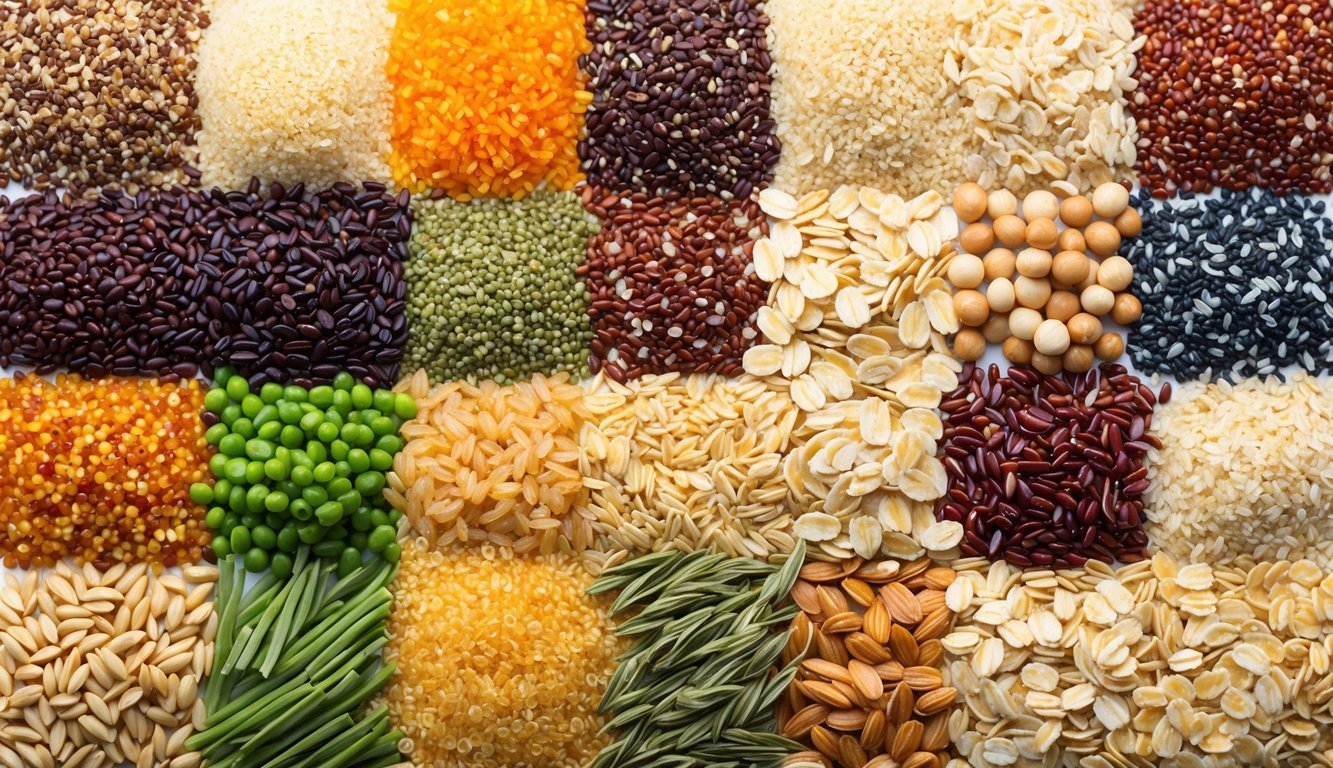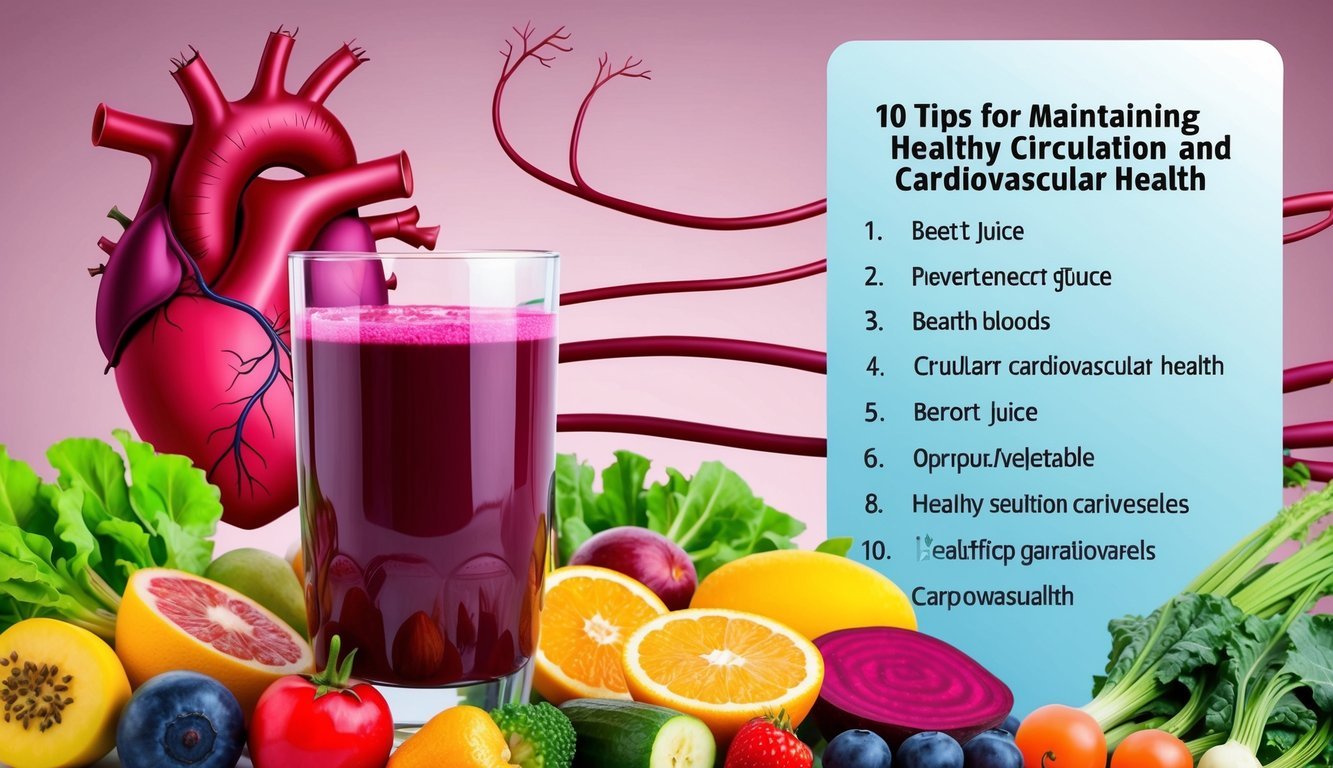Taking care of my cardiovascular health has always been a priority for me.
It’s essential to keep our blood circulation in check not just for physical fitness, but also for overall well-being. Maintaining healthy circulation and cardiovascular health can significantly reduce the risk of heart-related issues and improve daily energy levels.

There are simple, yet effective tips I’ve discovered that can make a real difference.
Incorporating these practices into my routine has transformed how I feel day-to-day, providing me with more vitality and a stronger foundation for a healthier lifestyle.
1) Stay Active Daily

Staying active is key to maintaining healthy circulation and overall cardiovascular health.
I find that incorporating movement into my daily routine makes a noticeable difference.
I try to aim for at least 150 minutes of moderate activity each week.
This can be anything from brisk walking to dancing.
Even gardening counts!
Finding activities I enjoy helps me stay motivated.
I make it a point to take short breaks throughout the day to stretch or go for a quick walk.
I also use opportunities like taking the stairs instead of the elevator.
These small choices add up over time.
When I engage in regular physical activity, I notice improvements in my energy levels and mood.
It’s a win-win!
Remember, the goal is consistency rather than intensity.
Starting small and increasing activity over time works for me.
Hydrate with Enough Water
Staying hydrated is key for my cardiovascular health.
Water helps my heart pump blood efficiently and supports overall circulation.
I aim to drink around eight cups of water a day, but my needs can vary.
A simple way to estimate is to divide my weight in pounds by two, giving me the number of ounces to aim for.
I’ve found that keeping a water bottle close makes it easier to sip throughout the day.
It’s also helpful to drink water first thing in the morning and before meals.
When I add a slice of lemon or cucumber, it makes hydrating more enjoyable.
Staying hydrated isn’t just about water; fluids from fruits and veggies also contribute to my intake.
In hot weather or during exercise, I make sure to drink even more.
This way, my body stays cool and functions at its best.
Keeping track of my hydration helps me feel more energetic and ready for the day.
3) Consume Omega-3 Rich Foods
Incorporating omega-3 rich foods into my diet has been beneficial for my cardiovascular health.
Omega-3 fatty acids are known to support healthy circulation and may reduce inflammation in the body.
I often turn to fatty fish like mackerel and salmon, which are packed with omega-3.
A serving of mackerel can offer around 4,580 mg of omega-3.
Plant-based sources are great alternatives as well.
Chia seeds and flaxseeds provide ample amounts of ALA, a type of omega-3.
I sprinkle chia seeds on my breakfast or add flaxseeds to smoothies to boost my intake.
Walnuts are another favorite of mine.
They offer a tasty, crunchy snack while supplying about 2.4 g of omega-3 per ounce.
With these omega-3 sources, I find it easy to enhance my meals while promoting better heart health.
Making simple swaps in my diet has made a noticeable difference.
4) Incorporate Dark Chocolate

I love treating myself to dark chocolate, and I’m glad to know it can benefit my cardiovascular health.
Dark chocolate, especially varieties with 70% cocoa or more, is rich in antioxidants that can improve blood flow and lower blood pressure.
When I indulge in a piece, I’m not just satisfying my sweet tooth; I’m also getting nutrients like iron, magnesium, and copper.
These minerals are essential for healthy circulation.
A regular serving can enhance the function of blood vessels, which is crucial for heart health.
Plus, it may even boost my mood.
I find it easy to incorporate dark chocolate into my diet.
I might enjoy it as a snack, add it to smoothies, or sprinkle it over my favorite desserts.
Just remember, moderation is key, as it can be calorie-dense.
Next time I crave something sweet, I’ll choose dark chocolate knowing it’s doing my heart some good!
5) Try Reducing Stress

Managing stress is crucial for keeping my heart and circulation in check.
Stress can create a range of physical responses in my body, like increased heart rate and blood pressure.
I’ve found that regular exercise helps me relieve tension.
Even a brisk walk can do wonders for my mood and heart health.
I also make it a point to practice deep breathing exercises.
This simple technique can calm my mind and lower my stress levels, which is great for my circulation.
Avoiding caffeine and smoking has made a noticeable difference in how I handle stress.
Both can heighten feelings of anxiety and lead to heart issues.
Eating a balanced diet rich in nutrients helps me maintain a healthy weight and minimizes stress.
When I prepare meals full of fruits and vegetables, I feel better physically and mentally.
It’s essential for me to recognize when I’m feeling overwhelmed.
Sometimes, talking to someone about my stressors can provide relief and support.
I find small changes can lead to significant benefits for my heart health.
6) Opt for Whole Grains

I’ve realized that whole grains are a smart choice for heart health.
Unlike refined grains, whole grains retain their fiber and nutrients.
This makes them beneficial for maintaining healthy cholesterol levels.
Incorporating whole grains into my diet has been easy.
I enjoy whole-grain bread, brown rice, and quinoa.
They add texture and flavor to meals, plus they help me feel full longer.
Eating whole grains may also reduce the risk of heart disease.
Studies show that they support a healthy gut microbiome, which is linked to lower inflammation in the body.
Choosing whole grains instead of processed options really makes a difference.
I’ve noticed that my energy levels are steadier throughout the day.
It’s a simple switch that gives me peace of mind for my cardiovascular health.
7) Enjoy a Glass of Red Wine
I like to relax with a glass of red wine now and then.
It can be part of a heart-healthy lifestyle when consumed in moderation.
Research suggests that red wine may help improve cardiovascular health.
The key component in red wine is resveratrol, found in grape skins.
This antioxidant can support the lining of blood vessels and boost HDL cholesterol, which is considered the “good” cholesterol.
I appreciate that it’s not only the wine but also grapes and grape juice that can provide similar benefits.
Moderate consumption is crucial.
It’s generally recommended to stick to one glass per day for women and up to two for men.
Too much alcohol can have negative effects, so it’s important to enjoy it responsibly.
Additionally, pairing red wine with a healthy meal can enhance the overall benefits.
Enjoying it with foods rich in polyphenols, like fruits and nuts, can promote heart health.
For me, it’s a simple and enjoyable way to contribute to my cardiovascular well-being.
8) Limit Processed Foods

I’ve noticed that minimizing processed foods can make a significant difference in how I feel.
These foods often contain high levels of added sugars, unhealthy fats, and excessive sodium, which aren’t great for my heart.
Instead of reaching for a packaged snack, I try to choose whole foods like fruits, vegetables, and whole grains.
These options offer essential nutrients that support circulation and improve overall health.
When I do cook, I focus on fresh ingredients.
Cooking at home allows me to avoid the hidden additives found in many processed items.
It helps me stay in control of what I eat and how it affects my body.
If I do indulge in convenience foods, I read labels carefully, opting for those with fewer ingredients and less processing.
It feels good to prioritize my health by making conscious choices about the foods I consume.
9) Quit Smoking

Quitting smoking has some serious perks for my cardiovascular health.
When I stop, my blood flow improves, which can lead to healthier arteries.
It’s encouraging to know that the damage from smoking can actually reverse over time.
I’ve read that my heart and lungs will function better just weeks after I quit.
I might experience less shortness of breath during physical activities, making exercise much easier.
Plus, my sense of taste and smell will bounce back.
It’s also a big money saver.
Smoking costs a lot, and when I stop, I can save hundreds or even thousands of dollars each year.
Taking this step can reduce my risk of heart disease significantly.
Since smoking harms nearly every organ, quitting allows my body to heal more effectively.
It’s a simple choice that packs a lot of punch for my health.
10) Include Beet Juice

I’ve found that incorporating beet juice into my diet can be beneficial for circulation and heart health.
Beet juice is rich in nitrates, which help widen blood vessels and improve blood flow.
Studies suggest that drinking beet juice may lower blood pressure.
I appreciate how it can support my cardiovascular system, especially after a workout.
It helps me feel energized and reduces fatigue during exercise.
Making beet juice is simple.
I just blend fresh beets with water and enjoy the vibrant drink.
It’s a natural way to boost my nutrient intake and support my heart.
It’s interesting how beets can contribute to overall well-being.
I like knowing that a delicious drink can have such positive effects on my body.
Understanding the Circulatory System
I find it fascinating how the circulatory system functions as a vital network within our body.
It not only delivers essential nutrients and oxygen to cells but also takes away waste products.
Let’s explore how blood circulation works and why maintaining healthy blood flow is crucial.
How Blood Circulation Works
Blood circulation is the process by which the heart pumps blood throughout the body.
It consists of two main circuits: the pulmonary and systemic systems.
-
Pulmonary Circulation: The heart sends oxygen-poor blood to the lungs, where it picks up oxygen and releases carbon dioxide.
-
Systemic Circulation: Oxygenated blood travels from the heart through arteries to deliver nutrients to tissues.
Veins then return oxygen-poor blood back to the heart, completing the cycle.
This intricate system ensures that every cell gets the necessary elements to function properly, emphasizing the importance of a healthy circulatory system.
Importance of Healthy Blood Flow
Maintaining healthy blood flow is essential for overall well-being.
Good circulation helps the body respond effectively to physical activity, heal from injuries, and regulate temperature.
When blood flows freely, it:
- Supports Organ Function: Organs like the heart and kidneys rely on efficient blood flow for optimal performance.
- Enhances Nutrient Delivery: Nutrients and oxygen reach cells more effectively.
- Promotes Waste Removal: Efficient circulation helps remove toxins from bodily tissues.
Conversely, poor circulation may lead to various health issues, including heart disease and fatigue.
It’s vital to adopt habits that support good blood flow to keep everything running smoothly.
Role of Diet in Cardiovascular Health
My diet plays a significant role in maintaining cardiovascular health and promoting healthy circulation.
By focusing on nutrient-rich foods, I can support my heart and blood vessels, helping to prevent issues like hypertension and high cholesterol.
Nutrients for Better Circulation
Certain nutrients are key players when it comes to heart health.
For starters, omega-3 fatty acids found in fish like salmon and walnuts help reduce inflammation and lower blood pressure.
Additionally, fiber-rich foods such as oats and beans can help lower cholesterol levels, further supporting cardiovascular health.
Potassium-rich foods like bananas and spinach also play a role in maintaining healthy blood pressure.
Incorporating these nutrients into your diet is one of the essential healthy heart tips for long-term well-being.
Antioxidants from fruits and vegetables combat oxidative stress.
These include vitamins C and E, found in citrus fruits, berries, and nuts.
Fiber is another essential element.
Particularly, soluble fiber from oats, lentils, and apples helps lower cholesterol levels and keeps blood sugar stable.
I make it a point to include potassium-rich foods, such as bananas and leafy greens, to help balance sodium levels and support proper blood vessel function.
Balancing these nutrients while avoiding ultra-processed foods can make a huge difference in how I feel and function.

